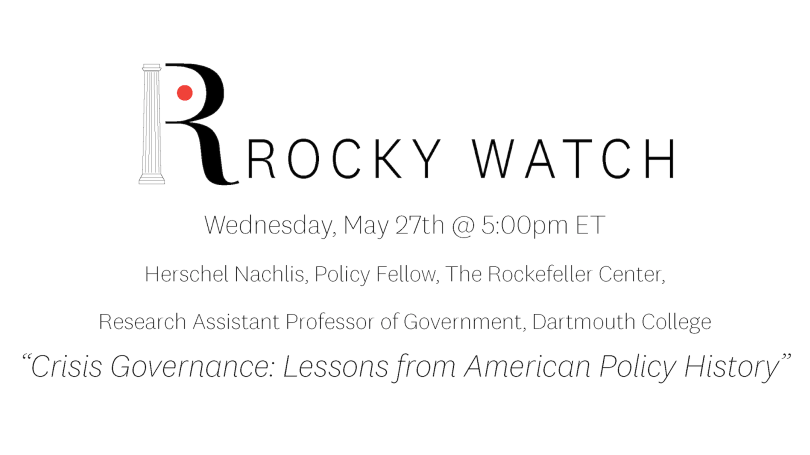
- Public Policy
- Leadership
- Funding
- News & Events
- About the Center
Back to Top Nav
Back to Top Nav
Back to Top Nav
Back to Top Nav
How does the United States government fare in the face of crises both past and present? In a “Rocky Watch” lecture live-streamed on May 27, 2020, Research Assistant Professor of Government Herschel Nachlis tackled this question. The lecture, “Crisis Governance: Lessons from American Policy History”, focused on patterns in crisis governance throughout the United States’ history.
Professor Nachlis explained, “I’m interested in how old policies, old governance structures, interact with new social problems and new political problems.” This broad perspective informs his interest in crisis governing. In an interview following the event, Professor Nachlis shared a few key takeaways.
First, while it is tempting to direct all criticism towards current political actors, we should also turn a critical eye to the deeper structural problems that inform present-day responses. Chief among those is the fact that “we have underinvested in public health for the last fifty to sixty years,” he said.
Should we have seen the COVID-19 pandemic coming? Many public officials and policymakers would say yes. Generally speaking, it is true that the U.S. government tends to “skimp on the prevention dimension and over-respond on the treatment dimension,” Professor Nachlis explained. But ex-ante investments are far less politically palatable, and experts’ warnings went unheeded. Professor Nachlis hopes this will change in the future.
In some cases, private actors and public-private partnerships have stepped forward to fill the holes left by this chronic underinvestment, particularly with respect to vaccine development. While the collaboration is encouraging, Professor Nachlis is worried by the fact that underinvesting in “strategic public health reserves [means] it's then left to the owner of a New England football team to take the team’s jet, fly to China to pick up masks, and fly those back to distribute them … private philanthropy shouldn’t be a substitute for government.”
Our present crisis has both a public health component and an economic component. The U.S. has no recent reference point for handling a pandemic; however, we do have a political playbook left over from last decade’s global recession. Circumstances may be different now compared to then, but we have “dusted off” and reused that playbook “to decent effect,” Professor Nachlis said. He added the caveat, however, that the playbook was imperfect then, and it is imperfect now.
Crises are typically bad news for incumbents and incumbent parties; Professor Nachlis predicts that we will see the effect of the crisis in election results this fall. Further, he explained that “crisis policies stick around once the crisis goes away,” meaning that the way the government responds now will influence policymaking norms far into the future.
-Written by Eliza Jane Schaeffer ’20, Rockefeller Center Student Program Assistant for Public Programs
Rocky Talk Podcast w/ Professor Herschel Nachlis: Apple Podcasts and Spotify.